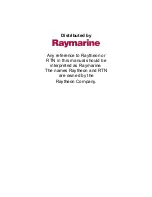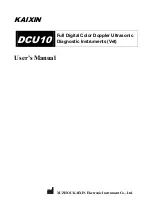
C T U M A N U A L
8
TEMPERATURE MANAGEMENT SYSTEM
3.5.4 Patient Temperature Channel Checks
Operator assistance is needed to perform the Patient Temperature
1 (PT1) checks. The operator is prompted to change CTU Switch 1
settings which sequences the system through measurement of a set
of precision resistors that simulate a patient temperature sensor at
various temperatures. Each check is completed when the following
criteria is met:
•
The difference between patient temperature average and the
respective CTU temperature value is within 0.8 °C.
•
The patient temperature is stable within 0.01 °C.
If any check cannot meet the above criteria within 60 seconds, an error
message is displayed. The check may be retried by selecting Continue.
Temporary calibration parameters are calculated based on the data
obtained from Check 1 (CTU value A) and Check 4 (CTU value D).
These parameters are then applied to the average values obtained for
all four checks. These values are then checked against the respective
CTU values that had been entered. The measured values must be within
0.14 °C of the CTU values for successful completion. An error message
is displayed if the criteria is not met.
The process is identical for Patient Temperature 2 (PT2) with the
exception of the S2 position.
3.5.5 Temperature Out Check
The Temperature Out Check is only performed when Check Calibration
has been selected. The Temperature Out Check is very similar to the
patient temperature checks in that the same four sensor simulators are
used. The operator is prompted to sequence CTU Switch 1 through a
PT1 measurement of each, while PT2 measures the Temperature Out.
(Temperature Out is an “echo” of Patient Temperature 1.) Obviously, this
test requires precise measurement by the patient temperature channels.
Therefore, the patient temperature checks must first be successfully
completed.
Each check is completed when the following criteria is met:
•
The difference between the Temperature Out average (as
measured by PT2) and the respective CTU temperature
value is within 1.0 °C.
•
The difference between the PT1 average and Temperature Out
average (as measured by PT2) is within 0.8 °C.
•
The Temperature Out (as measured by PT2) is stable within 0.01 °C
If any check cannot meet the those criteria within 75 seconds, an error
message is displayed.
3.5.6 Water Temperature Check
The system prompts the user to change the S3 position at the beginning
of the low temperature setpoint and then back after the low temperature
setpoint has completed. The system runs in Manual Mode for the
duration of the test. As the system runs, the water temperature is
controlled at various setpoints while PT1 measures the temperature
of the water flowing through the CTU. This reference temperature is
then used to check the system’s internal water temperature sensors.
The heater elements are checked, as well as, heating and cooling
capacity tests.
Four segments which normally take about 15 minutes each comprise
the Water Temperature Check. Check 1 takes place at approximately
6 °C, Check 2 at approximately 28 °C, Check 3 at approximately
40.5 °C, and Check 4 at approximately 38 °C. During this process,
Patient Temperature 1, Outlet Water Temperature 1 (T1), Outlet
Water Temperature 2(T2), Inlet Water Temperature (T3), Chiller
Temperature (T4), the inlet pressure, and the flow are continuously
averaged and monitored. Each check point requires the following to
complete successfully:
•
The average T2 must be within 2.0 °C of the corrected reference
temperature (i.e. the CTU probe as measured by PT1).
•
The corrected reference temperature must momentarily cross over
the desired cal. temperature (6 °C, 28 °C, and 40.5 °C) and then
cross back over again. The only exception is check 4 where the
reference temperature must only drop 6 degrees below 38 °C.
•
The Bypass Valve must be closed.
If a check cannot be completed in 30 minutes, a message is displayed.
Again, this test requires precise measurement by the patient
temperature channels. Therefore, the patient temperature checks
must first be successfully completed. Further, in the measurement of
water temperature, flow is also important. Therefore, the inlet pressure
check must also have been completed as suction is the driving force
in creating flow.
Newly calibrated temporary values are checked against the corrected
average probe temperature values obtained during the checks. Both T1
and T2 readings must be within 0.24 °C of the probe, the T3 sensor must
be within 0.4 °C of the probe reading, and the T4 sensor must be within
0.4 °C (checked at the 6 °C temperature only). An error message is
displayed if the criteria is not met.
3.5.7 Temperature Out Calibration
The final stage of calibration uses PT1 to measure the Temperature Out
as it is stepped through the range of possible values. This process takes
about 28 minutes. Upon completion, the calibration values are saved.
The information saved during the save process includes;
•
New calibration factors generated during the various checks.
•
CTU values (A through H) entered at the beginning of the test.
•
Calibration Hours value which was set to zero prior to the save.
The stored CTU values are set to defaults prior to conducting the
first calibration with the CTU. Additionally, stored CTU values will
automatically be set to defaults if the validity check value for any
of the CTU values is incorrect when retrieved from memory.
The default CTU values are:
A. 10.87 °C
B. 25.54 °C
C. 34.52 °C
D. 39.98 °C
E. 0.00 °C
F. 0.00 °C
G. 0.00 °C
H. 2900
Summary of Contents for Arctic Sun 5000
Page 2: ......
Page 12: ...12 TEMPERATURE MANAGEMENT SYSTEM GUIDE DU DISPOSITIF DE TEST D TALONNAGE...
Page 22: ...22 TEMPERATURE MANAGEMENT SYSTEM WARTUNGSHANDBUCH F R DAS KALIBRIERUNGSPR FGER T CTU...
Page 32: ...32 TEMPERATURE MANAGEMENT SYSTEM MANUALE UTC...
Page 42: ...42 TEMPERATURE MANAGEMENT SYSTEM MANUAL DE LA UPC...
Page 52: ...52 TEMPERATURE MANAGEMENT SYSTEM C T U H A N D L E I D I N G...
Page 62: ...62 TEMPERATURE MANAGEMENT SYSTEM M A N U A L D A U T C...
Page 72: ...72 TEMPERATURE MANAGEMENT SYSTEM M A N U A L D A U T C...
Page 82: ...82 TEMPERATURE MANAGEMENT SYSTEM C T U...
Page 92: ...92 TEMPERATURE MANAGEMENT SYSTEM C T U V E J L E D N I N G...
Page 102: ...102 TEMPERATURE MANAGEMENT SYSTEM C T U H A N D B O K...
Page 112: ...112 TEMPERATURE MANAGEMENT SYSTEM KALIBROINTITESTILAITTEEN K YTT OPAS...
Page 122: ...122 TEMPERATURE MANAGEMENT SYSTEM C T U H N D B O K...
Page 132: ...132 TEMPERATURE MANAGEMENT SYSTEM P O D R C Z N I K O B S U G I U T K...
Page 142: ...142 TEMPERATURE MANAGEMENT SYSTEM C T U K Z I K N Y V...
Page 152: ...152 TEMPERATURE MANAGEMENT SYSTEM P R U K A K C T U...
Page 162: ...162 TEMPERATURE MANAGEMENT SYSTEM C T U K I L A V U Z U...
Page 172: ...172 TEMPERATURE MANAGEMENT SYSTEM M A N U A L C T U...
Page 182: ...182 TEMPERATURE MANAGEMENT SYSTEM P R R U K A P R E J E D N O T K U C T U...
Page 192: ...192 TEMPERATURE MANAGEMENT SYSTEM...
Page 202: ...202 TEMPERATURE MANAGEMENT SYSTEM C T U...
Page 211: ...211 J A P A N E S E...
Page 212: ...212 TEMPERATURE MANAGEMENT SYSTEM C T U...
Page 221: ...221 C H I N E S E S I M P L I F I E D...
Page 222: ...222 TEMPERATURE MANAGEMENT SYSTEM C T U...
Page 231: ...231 C H I N E S E T R A D I T I O N A L...
Page 232: ...232 TEMPERATURE MANAGEMENT SYSTEM C T U...
Page 241: ...241 K O R E A N...









































